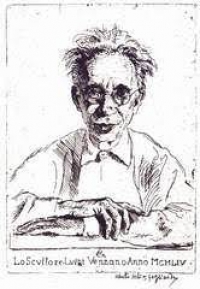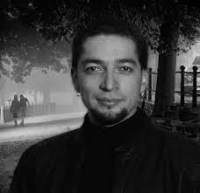Latest Sheet Music
Herbie Hancock

Herbert Jeffrey "Herbie" Hancock (born April 12, 1940) is an American pianist and composer. He is regarded not only as one of the greatest living jazz musicians, but also as one of the most influential jazz musicians of the 20th century. His music embraces elements of funk and soul while adopting freer stylistic elements from jazz. In his jazz improvisation, he possesses a unique creative blend of jazz, blues, and modern classical music, with harmonic stylings much like the styles of Claude Debussy and Maurice Ravel.
As part of Miles Davis's "second great quintet," Hancock helped redefine the role of a jazz rhythm section, and was one of the primary architects of the "post-bop" sound. Later, he was one of the first jazz musicians to embrace synthesizers and funk. Hancock's music is often melodic and accessible; he has had many songs "cross over" and achieved success among pop audiences.
Herbie's best-known solo works include "Cantaloupe Island," "Watermelon Man" (later performed by dozens of musicians, including bandleader Mongo Santamaria), "Maiden Voyage," "Chameleon," and the singles " I Thought It Was You" and "Rockit." His 2007 tribute album "River: The Joni Letters" won the 2007 Grammy Award for Album of the Year, only the second jazz album ever to win the award after 1965's Getz/Gilberto.
He is an adherent of the Nichiren school of Mahayana Buddhism.
As part of Miles Davis's "second great quintet," Hancock helped redefine the role of a jazz rhythm section, and was one of the primary architects of the "post-bop" sound. Later, he was one of the first jazz musicians to embrace synthesizers and funk. Hancock's music is often melodic and accessible; he has had many songs "cross over" and achieved success among pop audiences.
Herbie's best-known solo works include "Cantaloupe Island," "Watermelon Man" (later performed by dozens of musicians, including bandleader Mongo Santamaria), "Maiden Voyage," "Chameleon," and the singles " I Thought It Was You" and "Rockit." His 2007 tribute album "River: The Joni Letters" won the 2007 Grammy Award for Album of the Year, only the second jazz album ever to win the award after 1965's Getz/Gilberto.
He is an adherent of the Nichiren school of Mahayana Buddhism.
Josef Myrow
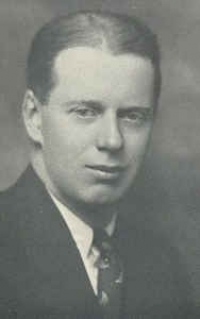
Josef Myrow (February 18, 1910 – December 24, 1987 in Los Angeles, California) was a Russian-born composer known for his work in film scores in the 1940s and 1950s. He was nominated for an Academy Award twice: in 1947 for the song "You Do" from the film Mother Wore Tights and in 1950 for "Wilhelmina" from the film Wabash Avenue. Both songs were written with Mack Gordon. Other notable compositions include "Autumn Nocturne" (with Kim Gannon) and "You Make Me Feel So Young" (again with Mack Gordon).He also wrote, with Robert Mills, "C A P Is on the Go" the official song of the Civil Air Patrol, the United States Air Force Auxiliary.
Hans Leo Hassler
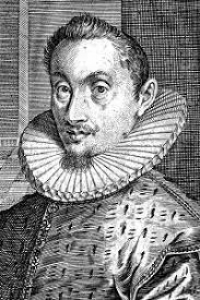
Ger. composer and organist. Org. at Augsburg 1586–1600, Nuremberg 1601–8, Dresden from 1608. Wrote It. canzonette, cantiones sacrae, madrigals, masses, and motets.
Sofia Gubaidulina
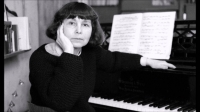
Sofia Asgatovna Gubaidulina (Russian: Софи́я Асгáтовна Губaйду́лина, Tatar: София Әсгать кызы Гобәйдуллина; born 24 October 1931) is a Tatar-Russian composer.
Music theory

Music theory is the study of the practices and possibilities of music. The Oxford Companion to Music describes three interrelated uses of the term "music theory"
Philippe Paquot
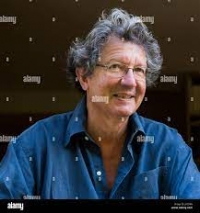
Philippe Paquet. Montreal, Québec. Philippe Paquet is a Canadian composer based in the Montreal region. He studied jazz guitar and classical composition at ...
Bach

Johann Sebastian Bach (31 March 1685 – 28 July 1750) was a German composer and organist whose sacred and secular works for choir, orchestra, and solo instruments drew together the strands of the Baroque period and brought it to its ultimate maturity. Although he introduced no new forms, he enriched the prevailing German style with a robust contrapuntal technique, an unrivalled control of harmonic and motivic organisation in composition for diverse musical forces, and the adaptation of rhythms and textures from abroad, particularly Italy and France.
Revered for their intellectual depth and technical and artistic beauty, Bach's works include the Brandenburg concertos; the Goldberg Variations; the English Suites, French Suites, Partitas, and Well-Tempered Clavier; the Mass in B Minor; the St. Matthew Passion; the St. John Passion; The Musical Offering; The Art of Fugue; the Sonatas and Partitas for violin solo; the Cello Suites; more than 200 surviving cantatas; and a similar number of organ works, including the celebrated Toccata and Fugue in D Minor.
While Bach's fame as an organist was great during his lifetime, he was not particularly well-known as a composer. His adherence to Baroque forms and contrapuntal style was considered "old-fashioned" by his contemporaries, especially late in his career when the musical fashion tended towards Rococo and later Classical styles. A revival of interest and performances of his music began early in the 19th century, and he is now widely considered to be one of the greatest composers in the Western tradition.
Revered for their intellectual depth and technical and artistic beauty, Bach's works include the Brandenburg concertos; the Goldberg Variations; the English Suites, French Suites, Partitas, and Well-Tempered Clavier; the Mass in B Minor; the St. Matthew Passion; the St. John Passion; The Musical Offering; The Art of Fugue; the Sonatas and Partitas for violin solo; the Cello Suites; more than 200 surviving cantatas; and a similar number of organ works, including the celebrated Toccata and Fugue in D Minor.
While Bach's fame as an organist was great during his lifetime, he was not particularly well-known as a composer. His adherence to Baroque forms and contrapuntal style was considered "old-fashioned" by his contemporaries, especially late in his career when the musical fashion tended towards Rococo and later Classical styles. A revival of interest and performances of his music began early in the 19th century, and he is now widely considered to be one of the greatest composers in the Western tradition.
Vocaloid

Vocaloid (ボーカロイド, Bōkaroido) is a singing voice synthesizer software product. Its signal processing part was developed through a joint research project led by Kenmochi Hideki at the Pompeu Fabra University in Barcelona, Spain, in 2000 and was not originally intended to be a full commercial project. Backed by the Yamaha Corporation, it developed the software into the commercial product "Vocaloid" that was released in 2004.
Ritz Ortolani
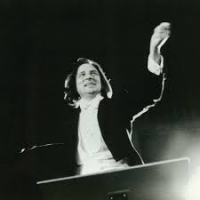
Riziero Ortolani (Italian pronunciation: ; 25 March 1926 – 23 January 2014) was an Italian composer, conductor, and orchestrator, predominantly of film scores. He scored over 200 films and television programs between 1955 and 2014, with a career spanning over fifty years.
Georges Bizet

Georges Bizet (25 October 1838 – 3 June 1875) was a French composer and pianist of the Romantic era. He is best known for the opera Carmen.
Bizet was born at 26 rue de la Tour d'Auvergne in the 9th arrondissement of Paris in 1838. He was registered with the legal name Alexandre César Léopold Bizet, but he was baptised on 16 March 1840 with the first name Georges, and he was always known thereafter as Georges Bizet. His father Adolphe Armand Bizet (1810-86) was an amateur singer and composer, and his mother, Aimée Léopoldine Joséphine née Delsarte (1814-61), was the sister of the famous singing teacher François Delsarte.
He entered the Paris Conservatory of Music on 9 October 1848, a fortnight before his tenth birthday. His teachers there were Pierre Zimmermann (fugue and counterpoint; often assisted by his son-in-law Charles Gounod), Antoine François Marmontel (piano), François Benoist (organ) and, on Zimmermann's death, Fromental Halévy, whose daughter he himself later married. He won first prizes for organ and fugue in 1855 and completed his earliest compositions.
His first symphony, the Symphony in C, was written in November 1855, when he was seventeen, evidently as a student assignment. It was unknown to the world until 1933, when it was discovered in the archives of the Paris Conservatory library. Upon its first performance in 1935, it was immediately hailed as a junior masterwork and a welcome addition to the early Romantic period repertoire. The symphony bears a stylistic resemblance to the first symphony of Gounod, first played earlier in the same year, and which Bizet had arranged for two pianos although present-day listeners may discern a similarity to music of Franz Schubert, whose work was little known in France at the time the symphony was written.
In 1857, a setting of the one-act operetta Le docteur Miracle won him a share in a prize offered by Jacques Offenbach. He also won the music composition scholarship of the Prix de Rome, the conditions of which required him to study in Rome for three years. There, his talent developed as he wrote such works as the opera buffa Don Procopio (1858-59). There he also composed his only major sacred work, Te Deum (1858), which he submitted to the Prix Rodrigues competition, a contest for Prix de Rome winners only. Bizet failed to win the Prix Rodrigues, and the Te Deum score remained unpublished until 1971. He made two attempts to write another symphony in 1859, but destroyed the manuscripts in December of that year. Apart from this period in Rome, Bizet lived in the Paris area all his life.
Shortly after leaving Rome in July 1860, but while still touring in Italy, he had the idea of writing a symphony in which each of the four movements would be a musical evocation of a different Italian city – Rome, Venice, Florence and Naples. On hearing of his mother's serious illness he cut short his Italian travels and returned to Paris in September 1860; she died a year later. The Scherzo of the symphony was completed by November 1861, but it was not until 1866 that the first version of the whole symphony was written. He subjected it to a number of revisions through to 1871, but died before ever producing what he considered the definitive version. For this reason, the work is sometimes described as "unfinished", but this is an inaccurate description as it was fully scored. It was published in 1880 as the Roma Symphony.
Bizet was born at 26 rue de la Tour d'Auvergne in the 9th arrondissement of Paris in 1838. He was registered with the legal name Alexandre César Léopold Bizet, but he was baptised on 16 March 1840 with the first name Georges, and he was always known thereafter as Georges Bizet. His father Adolphe Armand Bizet (1810-86) was an amateur singer and composer, and his mother, Aimée Léopoldine Joséphine née Delsarte (1814-61), was the sister of the famous singing teacher François Delsarte.
He entered the Paris Conservatory of Music on 9 October 1848, a fortnight before his tenth birthday. His teachers there were Pierre Zimmermann (fugue and counterpoint; often assisted by his son-in-law Charles Gounod), Antoine François Marmontel (piano), François Benoist (organ) and, on Zimmermann's death, Fromental Halévy, whose daughter he himself later married. He won first prizes for organ and fugue in 1855 and completed his earliest compositions.
His first symphony, the Symphony in C, was written in November 1855, when he was seventeen, evidently as a student assignment. It was unknown to the world until 1933, when it was discovered in the archives of the Paris Conservatory library. Upon its first performance in 1935, it was immediately hailed as a junior masterwork and a welcome addition to the early Romantic period repertoire. The symphony bears a stylistic resemblance to the first symphony of Gounod, first played earlier in the same year, and which Bizet had arranged for two pianos although present-day listeners may discern a similarity to music of Franz Schubert, whose work was little known in France at the time the symphony was written.
In 1857, a setting of the one-act operetta Le docteur Miracle won him a share in a prize offered by Jacques Offenbach. He also won the music composition scholarship of the Prix de Rome, the conditions of which required him to study in Rome for three years. There, his talent developed as he wrote such works as the opera buffa Don Procopio (1858-59). There he also composed his only major sacred work, Te Deum (1858), which he submitted to the Prix Rodrigues competition, a contest for Prix de Rome winners only. Bizet failed to win the Prix Rodrigues, and the Te Deum score remained unpublished until 1971. He made two attempts to write another symphony in 1859, but destroyed the manuscripts in December of that year. Apart from this period in Rome, Bizet lived in the Paris area all his life.
Shortly after leaving Rome in July 1860, but while still touring in Italy, he had the idea of writing a symphony in which each of the four movements would be a musical evocation of a different Italian city – Rome, Venice, Florence and Naples. On hearing of his mother's serious illness he cut short his Italian travels and returned to Paris in September 1860; she died a year later. The Scherzo of the symphony was completed by November 1861, but it was not until 1866 that the first version of the whole symphony was written. He subjected it to a number of revisions through to 1871, but died before ever producing what he considered the definitive version. For this reason, the work is sometimes described as "unfinished", but this is an inaccurate description as it was fully scored. It was published in 1880 as the Roma Symphony.
Alastair Greig
Alastair Greig is a composer based in London. His music has been performed in venues throughout the UK, Poland, Italy, France, Spain, Croatia, Switzerland, Ireland, Australia and the USA. Performers of his music include Rolf Hind, Peter O’Hagan, Singcircle, Gregory Rose, Sakari Oramo, Birmingham Contemporary Music Group, Daniel Barrett, Linda Wetherill, Francois Veilhan, Uroborus Ensemble, The Britten Sinfonia, Interensemble, Virelai, Lucja Szablewska, Sicilian Symphony Orchestra, Cantus Ensemble Zagreb, Maciej Żółtowski,Sydney Contemporary Orchestra, English Symphony Orchestra and the Polish Radio Symphony Orchestra.
Hermeto Pascoal
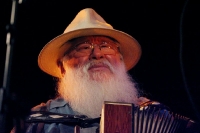
Hermeto Pascoal (born June 22, 1936) is a Brazilian composer and multi-instrumentalist. He was born in Lagoa da Canoa, Alagoas, Brazil. Pascoal is a significant figure in the history of Brazilian music, mainly known for his abilities in orchestration and improvisation, as well as being a record producer and contributor to many Brazilian and international albums.
Garth Brooks
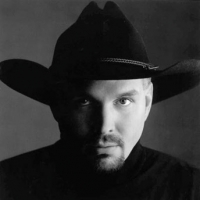
Troyal Garth Brooks, known professionally as Garth Brooks (born February 7, 1962) is an American country music singer-songwriter. Successfully integrating rock elements into his recordings and live performances, Brooks soon began to dominate the country singles and country album charts and quickly crossed over into the mainstream pop arena, exposing country music to a larger audience.
Brooks has enjoyed one of the most successful careers in popular music history, breaking records for both sales and concert attendance throughout the 1990s. The RIAA have certified his recording's at a combined (128× platinum), denoting roughly 113 million U.S shipments. He's also listed as the best-selling artist of Nielsen Soundscan era (1991 - onwards), with approximately 67,774,000 albums sold (as of April 5th, 2008). He is second only to The Beatles in America. To his credit, Garth Brooks has released six albums to achieve diamond status in the United States, those being; Garth Brooks - (10.00× Multi Platinum), No Fences - (17.00× Multi Platinum), Ropin' the Wind - (14.00× Multi Platinum), The Hits - (10.00× Multi Platinum), Sevens - (10.00× Multi Platinum) & Double Live - (21.00× Multi Platinum).
Troubled by conflicts between career and family, in 2001 Brooks officially retired from recording and performing. During this time he has sold millions of albums through an exclusive distribution deal with Wal-Mart and has sporadically released new singles.
Brooks has enjoyed one of the most successful careers in popular music history, breaking records for both sales and concert attendance throughout the 1990s. The RIAA have certified his recording's at a combined (128× platinum), denoting roughly 113 million U.S shipments. He's also listed as the best-selling artist of Nielsen Soundscan era (1991 - onwards), with approximately 67,774,000 albums sold (as of April 5th, 2008). He is second only to The Beatles in America. To his credit, Garth Brooks has released six albums to achieve diamond status in the United States, those being; Garth Brooks - (10.00× Multi Platinum), No Fences - (17.00× Multi Platinum), Ropin' the Wind - (14.00× Multi Platinum), The Hits - (10.00× Multi Platinum), Sevens - (10.00× Multi Platinum) & Double Live - (21.00× Multi Platinum).
Troubled by conflicts between career and family, in 2001 Brooks officially retired from recording and performing. During this time he has sold millions of albums through an exclusive distribution deal with Wal-Mart and has sporadically released new singles.
Ilio Volante

Was born in Italy in 1964, he was still a teen ager when he started his music studies (saxophone) showing from the very beginning a particular predisposition towards the music composition and Jazz music. At the age of 19 he won the audition for the Italian National Army Band stationed in Rome. He served it for 10 years under the direction of Col. Marino BARTOLONI. After this, he played in the Grenadiers of Sardinia’s Band (Rome) and the Shape International Band (the official Nato Band) stationed in Mons (BELGIUM). In this last post, he covered for three years the 1st Tenor Saxophone slot helping the Director, MSg Allen WITTIG, in doing the original arrangements for the Big Band. http://www.iliovolante.com http://www.musicaperbanda.com
Ferdinand David
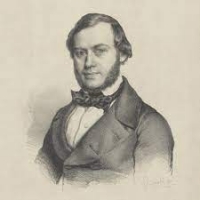
Ferdinand Ernst Victor Carl David (German: ; 19 June 1810 – 18 July 1873) was a German virtuoso violinist and composer.Born in the same house in Hamburg where Felix Mendelssohn had been born the previous year, David was raised Jewish but later converted to Protestant Christianity. David was a pupil of Louis Spohr and Moritz Hauptmann from 1823 to 1824 and in 1826 became a violinist at Königstädtischen Theater in Berlin. In 1829 he was the first violinist of Baron Carl Gotthard von Liphardt's (father of Karl Eduard von Liphart) string quartet in Dorpat and he undertook concert tours in Riga, Saint Petersburg and Moscow.
Ready Kirken
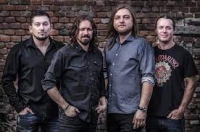
Ready Kirken Music Band About Career start: 1996 Albums: Krasohled, Cekal jsem vic, Vlny, Různorudé Album,
Record labels: Universal Music Group, Parlophone Czech Republic, Universal Music s.r.o., Ceral Zdeněk.
Record labels: Universal Music Group, Parlophone Czech Republic, Universal Music s.r.o., Ceral Zdeněk.
Traditional

Koji Kondo

Koji Kondo (近藤浩治 Kondō Kōji?, born August 13, 1960) is a Japanese video game composer and sound director who has been employed at Nintendo since 1984. He is best known for scoring numerous titles in the Mario and The Legend of Zelda series.
Borodin

Alexander Porfiryevich Borodin (12 November 1833 – 27 February 1887) was a Russian Romantic composer and chemist of Georgian–Russian parentage. He was a member of the group of composers called The Five (or "The Mighty Handful"), who were dedicated to producing a specifically Russian kind of art music. He is best known for his symphonies, his two string quartets, and his opera Prince Igor. Music from Prince Igor and his string quartets was later adapted for the musical Kismet.
Rodolphe Kreutzer
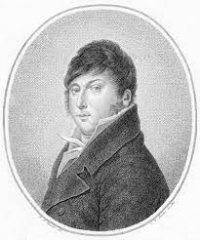
Rodolphe Kreutzer (15 November 1766 – 6 January 1831) was a French violinist, teacher, conductor, and composer of forty French operas, including La mort d'Abel (1810).He is probably best known as the dedicatee of Beethoven's Violin Sonata No. 9, Op. 47 (1803), known as the Kreutzer Sonata, though he never played the work. Kreutzer made the acquaintance of Beethoven in 1798, when at Vienna in the service of the French ambassador, Jean-Baptiste Bernadotte (later King of Sweden and Norway). Beethoven originally dedicated the sonata to George Bridgetower, the violinist at its first performance, but after a quarrel he revised the dedication in favour of Kreutzer.
Frederick the Great
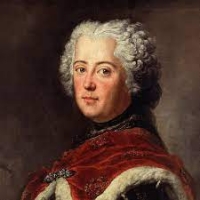
Frederick the GreatIn his youth, Frederick was more interested in music and philosophy than the art of war, which led to clashes with his authoritarian father, Frederick William I of Prussia. However, upon ascending to the Prussian throne, he attacked and annexed the rich Austrian province of Silesia in 1742, winning military acclaim for himself and Prussia. He then became an influential military theorist whose analysis emerged from his extensive personal battlefield experience and covered issues of strategy, tactics, mobility and logistics.
Henry Schradieck
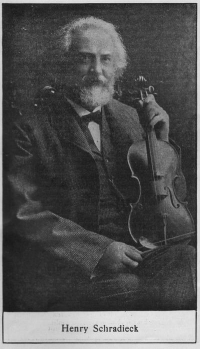
Henry Schradieck (29 April 1846 – 25 May 1918) was a German violinist, music pedagogue and composer. He was one of the foremost violin teachers of his day. He wrote a series of etude books for the violin which are still in common use todayBorn in Hamburg, he received his first violin lessons from his father, and made his first public appearance at the age of six. He studied under Hubert Léonard, at Royal Conservatory of Brussels, where he gained first prize. Afterwards he went to Leipzig, where he became a pupil of Ferdinand David. In 1863 he became a soloist at the Reinthaler concerts at Bremen. The following year he went to Moscow as Professor of the violin. In 1868 Schradieck returned to Hamburg, to take up the position of conductor of the Philharmonic Society, vacated by Leopold Auer. After six years he became concertmaster at the Gewandhaus Orchestra in Leipzig, professor at the Leipzig Conservatory, and leader of the theater orchestra.
Nikolai Rimsky-Korsakov
Nikolai Andreyevich Rimsky-Korsakov (Russian: Николай Андреевич Римский-Корсаков, IPA: (About this soundlisten); 18 March 1844 – 21 June 1908) was a Russian composer, and a member of the group of composers known as The Five. He was a master of orchestration. His best-known orchestral compositions—Capriccio Espagnol, the Russian Easter Festival Overture, and the symphonic suite Scheherazade—are staples of the classical music repertoire, along with suites and excerpts from some of his 15 operas. Scheherazade is an example of his frequent use of fairy-tale and folk subjects.
Sigfrid Karg-Elert
Sigfrid Karg-Elert (November 21, 1877 – April 9, 1933) was a German composer in the early twentieth century, best known for his compositions for organ and harmonium.Karg-Elert was born Siegfried Theodor Karg in Oberndorf am Neckar, Germany, the youngest of the twelve children of Johann Jacob Karg, a book dealer, and his wife Marie Auguste Karg, born Ehlert (sic). According to another account, however, his father was a newspaper editor and publisher (Conley 2001). The family finally settled in Leipzig in 1882, where Siegfried received his first musical training and private piano instruction.
Dragon Ball

Dragon Ball (Japanese: ドラゴンボール, Hepburn: Doragon Bōru) is a Japanese media franchise created by Akira Toriyama in 1984. The initial manga, written and illustrated by Toriyama, was serialized in Weekly Shōnen Jump from 1984 to 1995, with the 519 individual chapters collected into 42 tankōbon volumes by its publisher Shueisha. Dragon Ball was initially inspired by the classical 16th century Chinese novel Journey to the West, as well as Hong Kong martial arts films.
Thomas Seinen
Thomas Seinen musician, classical composer and arranger, known for writing new interpretations of many old classical pieces.
Béla Kovács

Béla Kovács (born May 1, 1937 in Tatabánya, Hungary) is a Hungarian clarinetist.He graduated from the Franz Liszt Academy of Music in Budapest, Hungary.He was principal clarinetist with the Hungarian State Opera Orchestra and the Budapest Philharmonic Orchestra since 1956, until he retired in 1981.Kovács has been a Professor of Clarinet at the Franz Liszt Academy of Music in Budapest and at the University of Music and Dramatic Arts in Graz, Austria. He has also composed a set of concert etudes for clarinet called "Hommages" that are written in the style of a number of different composers and are studied and/or performed widely today.
Wedding Collection
Piano Solo Songbook Piano solo arrangements of 25 classical favorites for weddings. Includes: Air on the G String * Bridal Chorus * Canon in D * Jesu, Joy of Man's Desiring * Ode to Joy * Rondeau * Sheep May Safely Graze * Trumpet Voluntary * Wedding March * more.
Ludwig van Beethoven

Ludwig van Beethoven (/ˈlʊdvɪɡ væn ˈbeɪt(h)oʊvən/ (About this soundlisten); German: (About this soundlisten); baptised 17 December 1770 – 26 March 1827) was a German composer and pianist. A crucial figure in the transition between the classical and romantic eras in classical music, he remains one of the most recognized and influential musicians of this period, and is considered to be one of the greatest composers of all time.
Beethoven was born in Bonn, the capital of the Electorate of Cologne, and part of the Holy Roman Empire. He displayed his musical talents at an early age and was vigorously taught by his father Johann van Beethoven, and was later taught by composer and conductor Christian Gottlob Neefe. At age 21, he moved to Vienna and studied composition with Joseph Haydn. Beethoven then gained a reputation as a virtuoso pianist, and was soon courted by Prince Lichnowsky for compositions, which resulted in Opus 1 in 1795.
Beethoven was born in Bonn, the capital of the Electorate of Cologne, and part of the Holy Roman Empire. He displayed his musical talents at an early age and was vigorously taught by his father Johann van Beethoven, and was later taught by composer and conductor Christian Gottlob Neefe. At age 21, he moved to Vienna and studied composition with Joseph Haydn. Beethoven then gained a reputation as a virtuoso pianist, and was soon courted by Prince Lichnowsky for compositions, which resulted in Opus 1 in 1795.
Heino Kaski
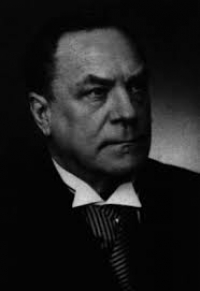
Kaski was born in Pielisjärvi into a cantor's family. His father taught him the violin, and was generally supportive: when Kaski dropped out of secondary school to study music full-time in Helsinki, he did not object. Kaski first studied at the Helsinki Cantor-Organist school, then entered the Philharmonic's Orchestra School. There, he continued studying the violin, but was also tutored in theory (by Ilmari Krohn) and composition (by Erkki Melartin).
Ivan Lins
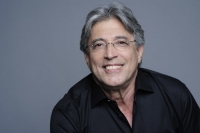
Ivan Guimarães Lins is a Latin Grammy-winning Brazilian musician. He has been an active performer and songwriter of Brazilian popular music and jazz for over thirty years. His first hit, "Madalena", was recorded by Elis Regina in 1970. "Love Dance", a hit in 1989, is one of the most recorded songs in musical history.
Giuseppe Tartini

Giuseppe Tartini (8 April 1692 – 26 February 1770) was an Italian Baroque composer and violinist born in the Republic of Venice.Tartini was born in Piran (now part of Slovenia), a town on the peninsula of Istria, in the Republic of Venice to Gianantonio – native of Florence – and Caterina Zangrando, a descendant of one of the oldest aristocratic Piranese families.it appears Tartini's parents intended him to become a Franciscan friar and, in this way, he received basic musical training. Tartini studied violin first at the collegio delle Scuole Pie in Capodistria (today Koper).
Jimmy Van Heusen
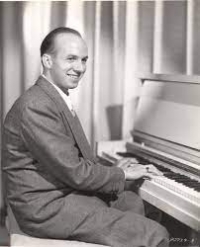
James Van Heusen (born Edward Chester Babcock; January 26, 1913 – February 6, 1990) was an American composer. He wrote songs for films, television and theater, and won an Emmy and four Academy Awards for Best Original Song.Born in Syracuse, New York, Van Heusen began writing music while at high school. He renamed himself at age 16, after the shirt makers Phillips-Van Heusen, to use as his on-air name during local shows. His close friends called him "Chet". Jimmy was raised Methodist.
Soulive

Soulive is a funk/jazz trio that originated in Woodstock, New York, and is known for its solos and catchy, upbeat songs. The band consists of Eric Krasno (guitar), Alan Evans (drums) and Neal Evans (Hammond B3 organ, bass keys, clavinet). Although they originated as a trio, the band has worked extensively with different horn sections, which have included Sam Kininger (saxophone) from 2000 to 2003, Rashawn Ross (trumpet), and Ryan Zoidis (saxophone) from 2003 to 2006. The band also worked with vocalist Toussaint Yeshua from 2006 to 2007. Soulive is currently touring in the original trio lineup of Eric Krasno, Alan Evans, and Neal Evans.
Margriet Verbeek
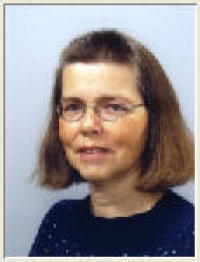
Was born in 1957 in Leiderdorp (The Netherlands), studied
classical guitar with Baltazar Benitez at the Brabant Academy for
Music, and composition with Jan van Dijk in Tilburg (The Netherlands)
classical guitar with Baltazar Benitez at the Brabant Academy for
Music, and composition with Jan van Dijk in Tilburg (The Netherlands)
Dan Burgess
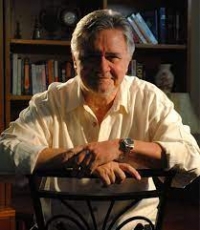
Dan Burgess Music Song Results · Ancient Of Days · Holy Holy Lamb · I Will Not Fear · I Will Praise Him · Ich bin bei dir · In His Holy Place · Joyful Joyful We Adore Thee (Hymn To Joy
Armando trovajoli
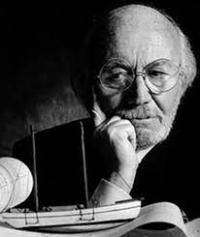
Armando Trovajoli was an Italian film composer and pianist with over 300 credits as composer and/or conductor, many of them jazz scores for exploitation films of the Commedia all'italiana genre. He collaborated with Vittorio De Sica on a number of projects, including one segment of Boccaccio '70.
The Raconteurs
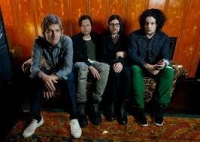
The Raconteurs is an American rock band from Detroit, Michigan, formed in 2005. The band consists of Jack White, Brendan Benson, Jack Lawrence, and Patrick Keeler. Lawrence and Keeler were originally members of the Greenhornes, while White and Lawrence went on to become members of the Dead Weather.
Francis Rocco Prestia

Francis Rocco Prestia Jr. was an American bassist, best known for his work with the funk band Tower of Power.
Cedar Walton
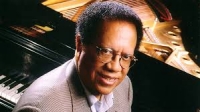
Cedar Anthony Walton, Jr. (January 17, 1934 – August 19, 2013) was an American hard bop jazz pianist. He came to prominence as a member of drummer Art Blakey's band before establishing a long career as a bandleader and composer. Several of his compositions have become jazz standards, including "Mosaic", "Bolivia", "Holy Land", "Mode for Joe" and "Fantasy in D".
Real Book

The Real Book refers to compilations of lead sheets for jazz standards. It usually refers to the first volume of a series of books transcribed and collated by Berklee College of Music students during the 1970s.The name is derived from "fake books", so called because they contained only rough outlines of music pieces rather than fully notated scores. Early fake books were often used by professional bands who performed mostly standards, often more geared to society and dance bands rather than jazz ensembles, and devoted much space to show tunes, novelty tunes, traditional jazz, etc. The first three Real Book volumes, in contrast, contained many bebop and other jazz standards that were likely to be encountered on jazz gigs at the time. For this reason, the books were quickly adopted among jazz players in the 1970s, particularly on the east coast.
Tom Horn
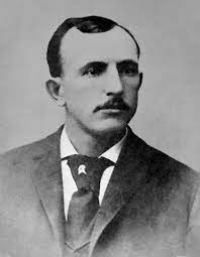
Tom Horn Musical artist Songs Soul Scheme Overload · 2017 The Last Day Guest Room · 2014 Berlheart Overload · 2017
Witold Lutosławski
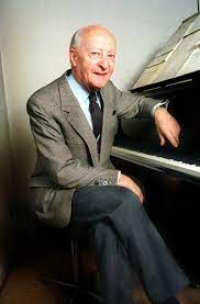
Witold Roman Lutosławski (Polish: (About this soundlisten); 25 January 1913 – 7 February 1994) was a Polish composer and conductor. Among the major composers of the 20th century, he is "generally regarded as the most significant Polish composer since Szymanowski, and possibly the greatest Polish composer since Chopin". His compositions—of which he was a notable conductor—include representatives of most traditional genres, aside from opera: symphonies, various orchestral works, chamber works, concertos, and song cycles, some of which he orchestrated. Of these, his best known works are his four symphonies, the Concerto for Orchestra (1954), the song cycle Twenty Polish Christmas Carols (1946), and a cello concerto (1970).
Jiri Lukes
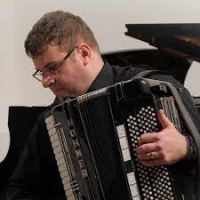
The Czech composer and accordionist Jiri Lukes studied composition (under Eduard Dousa) and accordion (under Ladislav Horak) at Prague Conservatory.
Marcos Valle
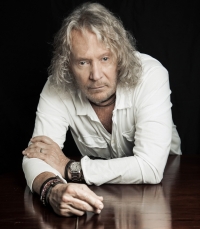
Marcos Kostenbader Valle is a Brazilian singer, songwriter, and record producer. He has produced works in many musical styles, including bossa nova, samba, and fusions of rock, soul, jazz, and dance music with Brazilian styles. Valle is regarded as one of the greatest Brazilian artists of all time.
Thao ngyugen

Thao Nguyen, also known as Thao, is an American singer-songwriter originally from Virginia and now based in San Francisco. She is the former lead singer, songwriter and figurehead of the defunct band Thao & the Get Down Stay Down, and has collaborated with Joanna Newsom and Andrew Bird.
 Sheet Music Network is a site for those who wants to access popular sheet music easily,
letting them download the sheet music for free for trial purposes.
It's completely free to download and try the listed sheet music, but you have to delete the files after 24 hours of trial.
Don't forget, if you like the piece of music you have just learned playing,
treat the artist with respect, and go buy the original sheet music.
Sheet Music Network is a site for those who wants to access popular sheet music easily,
letting them download the sheet music for free for trial purposes.
It's completely free to download and try the listed sheet music, but you have to delete the files after 24 hours of trial.
Don't forget, if you like the piece of music you have just learned playing,
treat the artist with respect, and go buy the original sheet music.
